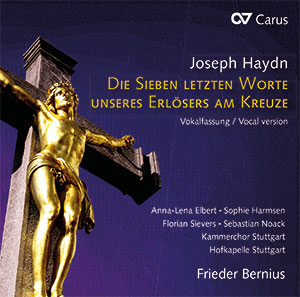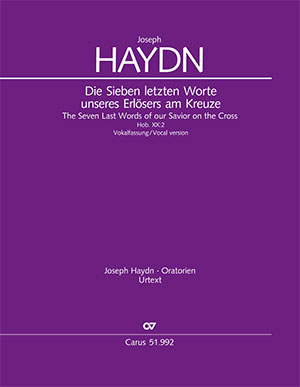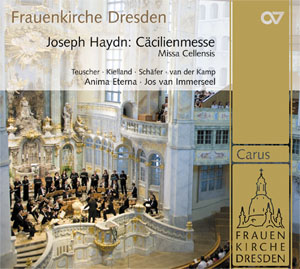Les Sept Dernières Paroles du Christ en croix
Frieder Bernius et le Kammerchor Stuttgart abordent une des passions les plus intéressantes de l’histoire de la musique : Die Sieben letzten Worte unseres Erlösers am Kreuze (Les sept dernières paroles du Christ en croix) ont dû avoir une importance toute particulière pour Haydn lui-même. Il a en effet réalisé trois versions différentes de cette œuvre et créé la version vocale enregistrée ici comme forme ultime.
Ce nouvel enregistrement avec Anna-Lena Elbert, Sophie Harmsen, Florian Sievers, Sebastian Noack et le Kammerchor Stuttgart sous la direction de Frieder Bernius atteint un niveau d’émotion difficilement égalable.
-
Compositeur
Joseph Haydn
| 1732-1809As Kapellmeister to Prince Esterházy, Haydn composed numerous instrumental works and various operas, as well as making important contributions to the genre of church music, including fourteen Latin masses, of which only twelve are authentic or complete; these are complemented by motets and offertories, two important Te Deum settings, two Salve Reginas, a Stabat Mater, and the different versions of the Sieben Worte des Erlösers am Kreuze. The masses were composed continually between 1749 and 1802, except for the years 1783–1795, and therefore constitute the genre with which Haydn was occupied over the longest period of time. The six (authentic or complete) masses composed before 1782 are stylistically very different, and as well as short Missae breves there are more extended masses with rich orchestral scoring; by contrast the six so-called late masses, written from 1796 onwards, form a comparatively homogeneous group of more extensive works scored for large forces. With his two great oratorios Die Schöpfung (The Creation) (1798) and Die Jahreszeiten (The Seasons) (1801) Haydn established the tradition of the German oratorio for middle-class music making. Plus d'information sur la personne
-
Chœur
Kammerchor Stuttgart
The Kammerchor Stuttgart is regarded as one of the best ensembles of its kind. Over its fifty-year existence, Frieder Bernius has developed the choir into an exceptional ensemble acclaimed by audiences and press alike. This has led to invitations for the choir to perform at all the important European festivals. In Germany the chamber choir performs at festivals and in concert halls in repertoire ranging from the 17th to the 21st century. Frieder Bernius and his ensemble have received numerous accolades for their contribution to new music. The Kammerchor Stuttgart has made over 80 CDs and LPs, numerous of which have been awarded international recording prizes (including the Edison award, Diapason d’or, Gramophone Choice, Classical Internet Award, International Classical Music Award, and German Record Critics’ Award prizes). The International Federation for Choral Music has invited the ensemble to sing at the 1st, 4th and 10th World Symposia on Choral Music in Vienna, Sydney and Seoul. Regular tours of North America and Asia since 1988 and a South America tour reflect the Kammerchor Stuttgart’s international reputation. Since 1984 the top ensemble has also been invited to Israel biennially. Plus d'information sur la personne
-
Orchestre
Hofkapelle Stuttgart
La Hofkapelle Stuttgart, créée en 2006 par Frieder Bernius pour compléter le Barockorchester Stuttgart, se consacre au répertoire du 19ème siècle sur des instruments historiques. Un centre de gravité est la redécouverte de trésors de l’histoire de la musique, notamment dans la région du sud-ouest de l’Allemagne (Kalliwoda, Knecht, Holzbauer). Hofkapelle et Barockorchester Stuttgart sont les hôtes réguliers de festivals internationaux (Rome, Salzbourg, Göttingen, Dresde). Leurs productions pour le CD se sont vues décerner des prix à plusieurs reprises : la Missa Dei Patris de Jan Dismas Zelenka a été nominée pour le Cannes Classical Award, la musique de scène du Songe d’une Nuit d’été de Félix Mendelssohn Bartholdy d’après Shakespeare a été distinguée par Rondo et a remporté l’Étoile du mois de la revue Fono Forum. Le Requiem de W.A. Mozart a obtenu le Diapason d’or de l’année 2003, l’opéra de Johann Gottlieb Naumann Aci e Galatea a été nommé enregistrement d’opéra de l’année dans la revue spécialisée Opernwelt, l’Oratorio de Pâques de Bach figure dans la liste des meilleurs enregistrements du prix de la Critique allemande du disque. L’enregistrement de la Messe en si mineur de Bach a été editors choice de la revue Gramophone. Plus d'information sur la personne
-
Chef d'orchestre
Frieder Bernius
| 1947Frieder Bernius’s work has earned great worldwide recognition. He is in demand internationally as a conductor and as a teacher. His principal artistic collaborators are the ensembles he founded himself, the Kammerchor Stuttgart, the Barockorchester Stuttgart, the Hofkapelle Stuttgart and the Klassische Philharmonie Stuttgart. As a guest conductor, he has collaborated repeatedly with, for example, the SWR Vokalensemble Stuttgart, the Deutsche Kammerphilharmonie Bremen, the Stuttgarter Kammerorchester and the Streicherakademie Bozen. Great stylistic versatility is Frieder Bernius’s hallmark. Whether he conducts vocal works by Monteverdi, Bach, Händel, Mozart, Beethoven, Fauré and Ligeti, stage music by Mendelssohn or symphonies by Haydn, Burgmüller and Schubert, his work always aims for a sound that is at once unmistakably personal and at the same time oriented towards the original period sound ideal. He devotes himself equally to the rediscovery of 18th century operas and to first performances of contemporary compositions. He is particularly interested in the musical history of southwestern Germany. Carus-Verlag has awarded Frieder Bernius a Golden CD for his complete recording of the sacred music of Felix Mendelssohn Bartholdy. The award was presented to him during the German Choir Festival in Stuttgart 2016. The sale of over 250,000 recordings, which has been acclaimed with a number of awards, has made a not insignificant contribution to what today is the obvious presence of Mendelssohn's complete œuvre in the concert repertoire. Plus d'information sur la personne
-
Solist - soprano
Anna-Lena Elbert
-
Solist - alto
Sophie Harmsen
-
Solist - ténor
Florian Sievers
-
Solist - basse
Sebastian Noack
The baritone Sebastian Noack was born in Berlin and studied singing with Dietmar Hackel, Ingrid Figur and Dietrich Fischer-Dieskau. He became known after being awarded 1st prize at the Bundeswettbewerb Gesang; other prizes followed. Since then he has made a name for himself, particularly as a concert singer, performing under renowned conductors such as Frieder Bernius, Marcus Creed, Christoph Eschenbach, and Roy Goodman. His repertoire includes all of the significant oratorios from the Renaissance to the present time. On numerous tours he has travelled through all of Europe, the USA and Southeast Asia. He is a welcome guest at international festivals. Noack sings with the large broadcasting networks and well-known Baroque orchestras as well as with chamber music ensembles, e.g., the Sharoun Ensemble or Sabine Meyer’s Trio di Clarone. He has participated in CD productions under Philippe Herreweghe and Andreas Spering. Noack is particularly interested in lieder. Together with the pianist Manuel Lange, he founded the new concert series “Meisterlied im Musikinstrumenten-Museum”, for which – in addition to his own recitals – he has already been able to engage renowned guests. After having previ - ously performed concertante or semi-scenic operas, Noack made his stage debut in Donizetti’s Viva la Mamma at the Berlin State Opera in June 2009. He is a visit ing professor at the Hochschule für Musik Hanns Eisler in Berlin. Plus d'information sur la personne
Critiques
This is a cool, immaculate performance in which every element is perfectly balanced and every phrase neatly turned.
Choir & Organ, November 2022, Vol. 30, Nr. 9
Der Kammerchor Stuttgart präsentiert sich in seiner üblichen Klangschönheit und Ausdrucksstärke, die Interpretation, angeleitet von Frieder Bernius, zeugt von starker Auseinandersetzung mit dem Inhalt des Werk...
Singende Kirche, Sept 2022, Heft 3, 69. Jahrgang
Das gelingt hier alles ganz hervorragend, durch allseitig schlanke Tongebung und vor allem durch die weite Verteilung metrischer Schwerpunkte.
CHOR aktuell, Juni 2022
...erreicht eine kaum zu übertreffende Emotionalität.
Kirche in Bistum Aachen, April 2022
Klassiknews, März 2022
Questions fréquentes sur l'œuvre
 Il n'y a pas encore de questions et réponses concernant cette œuvre ou vous n'avez pas trouvé la réponse à votre question sur l'œuvre ? Cliquez ici et envoyez votre question spécifique à notre service clients.
Il n'y a pas encore de questions et réponses concernant cette œuvre ou vous n'avez pas trouvé la réponse à votre question sur l'œuvre ? Cliquez ici et envoyez votre question spécifique à notre service clients.







